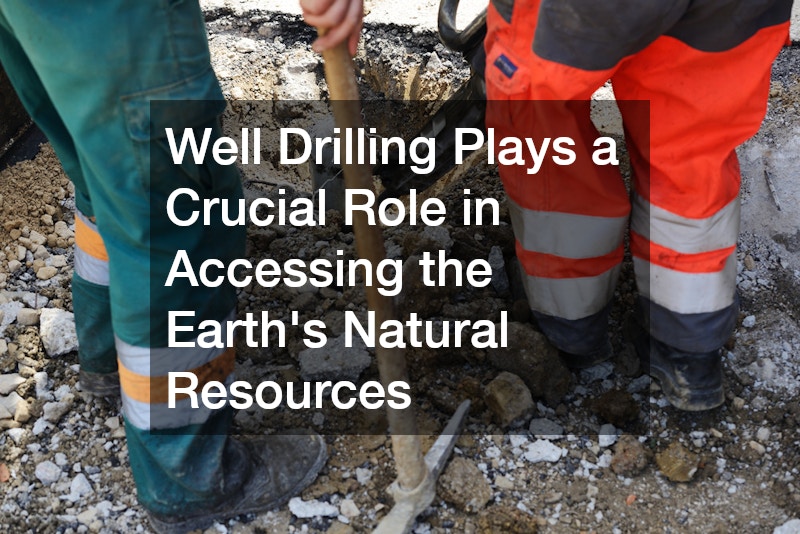Well drilling plays a crucial role in accessing the Earth’s natural resources. It is a complex process that requires a blend of engineering expertise, advanced technology, and safety protocols to ensure success. With the world’s increasing demand for water and energy, efficient and precise well drilling services are more essential than ever.
Focusing on safety, precision, and efficiency, this industry continues to evolve, making strides in innovative techniques and equipment.
The history of drilling dates back to ancient times, but modern advancements have significantly transformed the process. In the past, wells were dug manually, but today, advanced machinery and techniques have revolutionized the field. These improvements allow for deeper drilling, access to more challenging locations, and a higher degree of accuracy in reaching targeted depths. As a result, modern drilling can accommodate a variety of applications, including residential, agricultural, and industrial needs.
While the technical aspects of well drilling are crucial, so is ensuring environmental sustainability and safety. Current practices aim to minimize environmental impact and ensure the safety of both workers and surrounding communities. By focusing on sustainable techniques and adhering to regulations, drilling services contribute positively to resource management. As the industry grows, ongoing innovation and a commitment to safety and efficiency remain paramount.
Advancements in Well Drilling Technology
The advancement in well drilling technology has brought about safer and more efficient methods. Modern rigs incorporate sophisticated technologies such as automated drilling systems, GPS-guided equipment, and data analytics to enhance precision. Automation reduces human error, increases speed, and enhances safety by minimizing the need for manual labor in hazardous conditions. These technological innovations support the industry’s goal to deliver precise and efficient drilling services.
Improved drill bits and measurement while drilling (MWD) systems have also significantly enhanced well drilling processes. High-performance drill bits now allow for faster penetration rates and greater durability, reducing the time and cost associated with drilling projects. MWD systems provide real-time data on wellbore conditions, allowing for immediate adjustments and increased accuracy in reaching the desired depth and location. These advancements not only streamline operations but also ensure that projects are completed within budget and on time.
The integration of predictive maintenance technology is another advancement revolutionizing the drilling industry. By using sensors and analytics, companies can predict equipment failures before they occur, reducing downtime and maintenance costs. This proactive approach not only increases efficiency but also extends the lifespan of the equipment, further contributing to cost savings. As technology continues to advance, well drilling services become increasingly sophisticated and reliable.
The Importance of Safety in Well Drilling
Safety is a top priority in drilling operations. The high-risk environment necessitates stringent safety protocols and training for all personnel involved. Regular safety drills and the use of personal protective equipment (PPE) are essential components of a safe work environment. By prioritizing safety, well drilling companies can prevent accidents and ensure the well-being of their workers.
The implementation of safety management systems (SMS) helps in identifying potential hazards and establishing safety measures. These systems involve comprehensive risk assessments and the development of emergency response plans. An effective SMS not only minimizes the risk of accidents but also enhances operational efficiency by fostering a culture of safety. Continuous training and education are vital to ensuring that workers are aware of the latest safety practices and procedures.
Regulatory compliance plays a crucial role in maintaining safety standards in the drilling industry. Adhering to local and international safety regulations ensures that companies operate within legal frameworks and maintain high safety standards. Compliance with these regulations not only protects workers but also helps companies avoid legal liabilities and potential fines. By emphasizing safety, the well drilling industry demonstrates its commitment to protecting its workforce and preserving natural resources.
Safe, efficient, and precise well drilling services are integral to meeting the growing demand for natural resources. The advancements in technology, coupled with stringent safety measures, have significantly improved the industry’s capabilities. With a focus on environmental sustainability and regulatory compliance, drilling companies are well-equipped to handle the challenges of modern resource extraction. As the industry continues to evolve, its commitment to innovation, safety, and efficiency remains steadfast.
Well drilling services are essential not only for accessing water and energy resources but also for supporting economic development. By providing reliable and sustainable solutions, these services contribute to the global effort to manage and utilize natural resources responsibly. As new technologies emerge and safety practices improve, the industry is poised to continue its trajectory of growth and success. Through a commitment to excellence, drilling services will continue to play a vital role in shaping the future of resource management.
The well drilling industry stands as a testament to the power of innovation and the importance of safety. By integrating advanced technologies and maintaining rigorous safety standards, the industry meets the demands of a world eager for resources. As it persists in its evolution, drilling services will remain a cornerstone of sustainable resource management, ensuring access to vital resources while safeguarding the planet for future generations.

